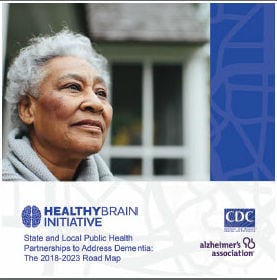Educating and Training Professionals
A Health Brain Initiative Issue Map
EDUCATING AND TRAINING PROFESSIONALS to Make Alzheimer’s Our Next Public Health Success Story
By 2050, nearly 14 million Americans may be living with Alzheimer’s dementia, an increase from the estimated 5.8 million in 2019.1 As the population affected by dementia grows, the public health, healthcare, and other workforces urgently need additional competencies for coping with this challenge.
Strategies are needed to equip public health professionals with sound and credible information so that they are well-informed when engaging partners from multiple sectors including healthcare, community service groups, and the aging network. They also need to understand the best available evidence in order to perform their role assuring providers have essential competencies when caring for people with dementia. To improve both early diagnoses and professional care for people with dementia, public health can join with academic institutions, clinical practices, and caregiver organizations on educational initiatives that enhance the knowledge and abilities of nurses, social workers, pharmacists, physicians, community health workers, home health professionals, and more. Some essential areas for education include:
» Importance of early detection, diagnosis, documentation of diagnosis, and care of Alzheimer’s and other dementias.
» Availability of resources including validated clinical assessment tools, online training, and community-based social services.
» Effective strategies to convey diagnoses and resource referral information in ways that are culturally-appropriate, candid, clear, and compassionate for different populations.
» Value of comprehensive care planning.
» Strategies to support caregivers’ health and their role.»Care management for people with dementia, including co-morbidities.
COMPELLING DATA
The current public health workforce has had little or no formal preparation on dementia as a public health issue.¹ Further, shortages of qualified healthcare workers could jeopardize care for individuals living with Alzheimer’s and other dementias.
Current training does not adequately prepare healthcare workers to deal with the unique needs of people living with dementia. As of 2015:
» Only two states required training in dementia for registered nurses, licensed practical nurses, and licensed vocational nurses.
» Just 23 states required dementia training for staff of nursing homes, and the majority of states that did require training did so only for personnel in Alzheimer’s special care units.
» Only 19 states required dementia training for adult day staff, and only 13 states required it for licensed home health aides.2
» Less than 3% of medical students choose geriatric electives during their training, which means that most will enter the workforce with little exposure to the needs of older adults.3
» In New York State, an evaluation of the first year of the Alzheimer’s Disease Caregiver Support Initiative found many providers encountered staffing challenges related to an insufficient number of applicants experienced in dementia care.4
- Alzheimer’s Association. (2019). 2019 Alzheimer’s Disease Facts and Figures. Alzheimers Dement;15(3):321-387. Available at alz.org/facts.
- Burke G, Orlowski, G. (2015).Training to serve people with dementia: Is our health care system ready? Washington, DC: Justice in Aging.
- Moore MJ, Moir P, Patrick MM. (2004). The State of aging and health in America: 2004. Washington, DC: The Merck Institute of Aging and Health.
- New York State Department of Health. (2018). Alzheimer’s Disease Caregiver Support Initiative Evaluation Report Year 1. Albany, NY: New York State Department of Health.
THE EDUCATION AND TRAINING ACTION AGENDA
The Healthy Brain Initiative’s (HBI) State and Local Public Health Partnerships to Address Dementia, The 2018–2023 Road Map charts a course for state and local public health agencies and their partners to act quickly and strategically to prepare all communities by stimulating changes in policies, systems, and environments. Many of the Road Map’s 25 expert-developed actions would help educate and inform professionals about Alzheimer’s, other dementias, cognitive issues, and dementia caregiving to better serve these populations.

P-2
Assure academic programs, professional associations, and accreditation and certification entities incorporate the best available science about brain health, cognitive impairment, and dementia caregiving into training for the current and future public health workforces.
P-3
Support better informed decisions by educating policymakers on the basics of cognitive health and impairment, the impact of dementia on caregivers and communities, and the role of public health in addressing this priority problem.
P-6
Assure public health plans that guide emergency preparedness and emergency response address the special needs of people with dementia and their caregivers, support access to critical health information during crises, and prepare emergency professionals for situations involving people with dementia.

M-4
Embed evaluation into training and caregiving support programs to determine program accessibility, effectiveness, and impact.
M-5
Estimate the gap between workforce capacity and anticipated demand for services to support people with dementia and their caregivers.

W-1
Educate public health and healthcare professionals on sources of reliable information about brain health and ways to use the information to inform those they serve.
W-2
Ensure that health promotion and chronic disease interventions include messaging for healthcare providers that underscores the essential role of caregivers and the importance of maintaining their health and well-being.
W-3
Educate public health professionals about the best available evidence on dementia (including detection) and dementia caregiving, the role of public health, and sources of information, tools, and assistance to support public health action.
W-4
Foster continuing education to improve healthcare professionals’ ability and willingness to support early diagnoses and disclosure of dementia, provide effective care planning at all stages of dementia, offer counseling and referral, and engage caregivers, as appropriate, in care management.
W-5
Strengthen the competencies of professionals who deliver healthcare and other care services to people with dementia through interprofessional training and other strategies.
W-6
Educate healthcare professionals about the importance of treating co-morbidities, addressing injury risks, and attending to behavioral health needs among people at all stages of dementia.
W-7
Educate healthcare professionals to be mindful of the health risks for caregivers, encourage caregivers’ use of available information and tools, and make referrals to supportive programs and services.

For the full HBI Road Map, data, ready-touse
resources, and case studies, visit:
alz.org/publichealth or cdc.gov/aging.
PUBLIC HEALTH STRATEGIES TO EXPAND AND IMPROVE DATA COLLECTION
The following are examples of how public health departments are using data and evidence to address Alzheimer’s and other dementias.
COLORADO

The Colorado Department of Public Health and Environment (CDPHE) partnered with the Alzheimer’s Association Colorado Chapter to implement a program called Approaching Alzheimer’s: First Responder Training Program to educate Emergency Medical Service (EMS) providers in providing dementia-competent services. This program addresses the many 911 calls to help and treat older adults who may have unique medical, social, and communication challenges due to cognitive difficulties.
They provide free, in-person training at all 11 of Colorado’s Regional Emergency and Trauma Advisory Councils as well as free online training, which is accessible at any time. EMS providers receive a certificate upon completion of the training. This training helps first responders navigate situations in which Alzheimer’s patients may be wandering, driving, or caught shoplifting. They learn the signs and symptoms of dementia and how to best respond in these circumstances.
UTAH

In 2017, the Utah Department of Health (UDOH) partnered with the Dementia Dialogues program from the Arnold School of Public
Health at the University of South Carolina to enhance training for those caring for people living with Alzheimer’s and other dementias.
The program is a free five-session training course suitable for social workers, caregivers, nurses, and medical professionals who may not have received adequate training on the unique challenges of dementia. Certified instructors from University of South
Carolina deliver these evidence-informed trainings in the community.
Dementia Dialogues sessions include information on recognition and usage of non-verbal cues, ways to promote independence, strategies to work with challenging behavior, tools to help devise care plans, medication management, and injury reduction. Over 1,000 people have completed the series in Utah and earned a Dementia Specialist certificate and 7.5 Continuing Education Units (CEUs).
The full HBI Road Map, other examples of strategies used by state public health agencies, and additional resources are available at alz.org/publichealth and cdc.gov/aging. Data to guide your efforts can be found on your state’s portal at alz.org/publichealth and at the Centers for Disease Control and Prevention’s Healthy Aging Data Portal at cdc.gov/aging.
Disclaimer
The mark “CDC” is owned by the U.S. Department of Health and Human Services (HHS) and is used with permission. Use of this logo is not an endorsement by HHS or the Centers for Disease Control and Prevention (CDC) of any particular product, service, or enterprise.
